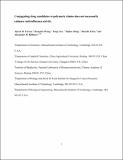Conjugating drug candidates to polymeric chains does not necessarily enhance anti-influenza activity
Author(s)
Larson, Alyssa Maxine; Wang, Hongmei; Cao, Yang; Jiang, Taijiao; Chen, Jianzhu; Klibanov, Alexander M.; ... Show more Show less
DownloadFinal-Conjugating drug candidates to polymeric chains does not necessarily enhance anti-final.pdf (2.722Mb)
OPEN_ACCESS_POLICY
Open Access Policy
Creative Commons Attribution-Noncommercial-Share Alike
Terms of use
Metadata
Show full item recordAbstract
Using the plaque reduction assay, relatively simple bicyclic quinone molecules, as well as multiple copies thereof covalently attached to a long polyglutamate-based polymeric chain, were examined as new inhibitors of various naturally occurring strains of influenza A virus. The polymer-conjugated inhibitors were found to have a far greater potency (for some as high as two orders of magnitude when a long spacer arm was employed) than their corresponding parent molecules against the human Wuhan influenza strain. However, such polymeric inhibitors failed to exhibit higher potency compared with their small molecule predecessors against the human Puerto Rico and avian turkey influenza strains. These observations, further explored by means of molecular modeling, reveal the previously unrecognized unpredictability of the benefits of multivalency, possibly because of poor accessibility of the viral targets to polymeric agents
Date issued
2012-07Department
Massachusetts Institute of Technology. Department of Biological Engineering; Massachusetts Institute of Technology. Department of Biology; Massachusetts Institute of Technology. Department of Chemistry; Koch Institute for Integrative Cancer Research at MITJournal
Journal of Pharmaceutical Sciences
Publisher
Wiley Blackwell
Citation
Larson, Alyssa M. et al. “Conjugating Drug Candidates to Polymeric Chains Does Not Necessarily Enhance Anti-influenza Activity.” Journal of Pharmaceutical Sciences 101.10 (2012): 3896–3905.
Version: Author's final manuscript
ISSN
0022-3549
1520-6017